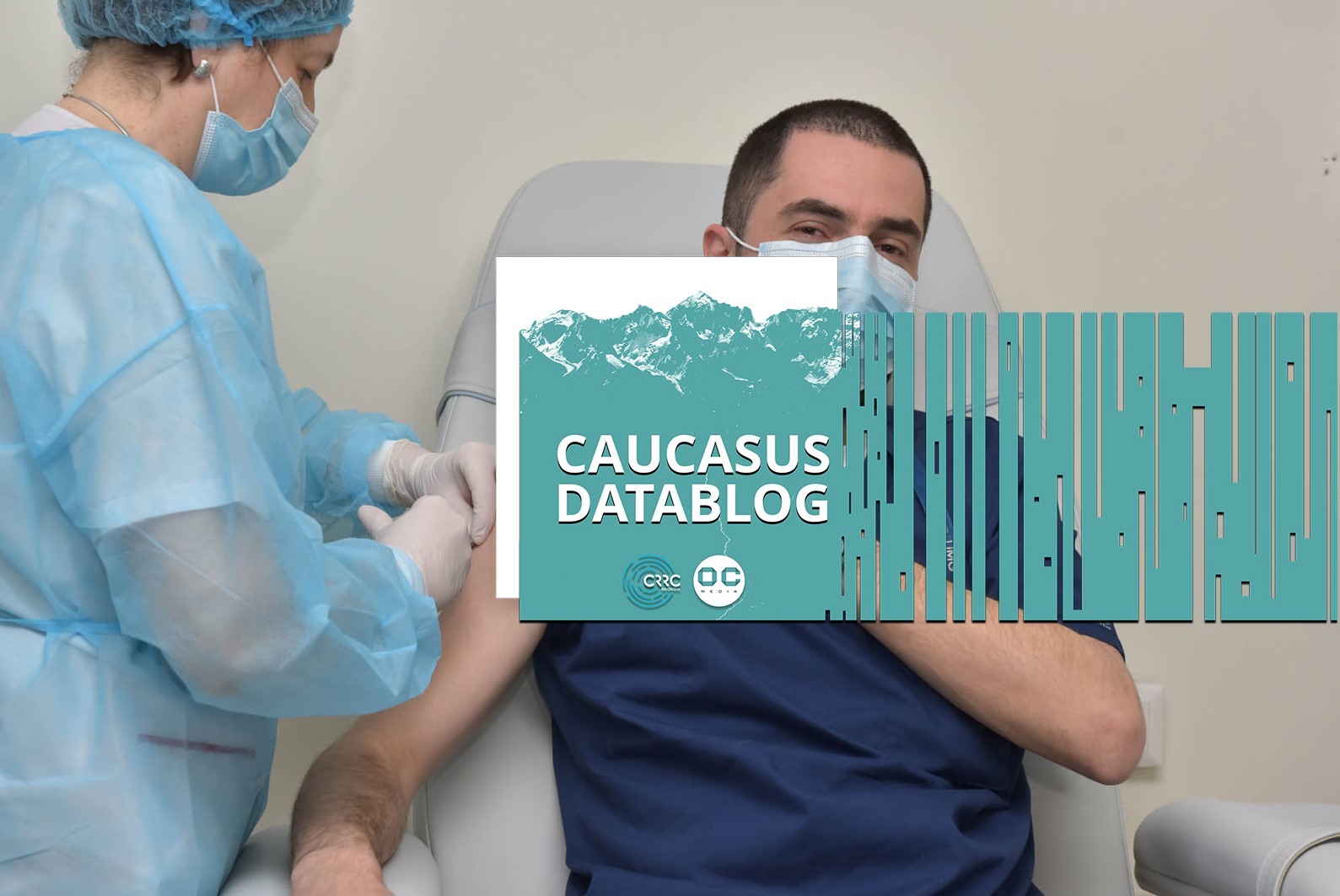
With two kinds of vaccines against COVID-19 already available in Georgia, the public’s attitude towards vaccination is becoming more and more important. So why are Georgians so sceptical of coronavirus vaccination?
While willingness to get vaccinated against COVID-19 was not high even in June or December 2020, it is logical to suppose that hesitation would only have increased after the unfortunate case of a young nurse passing away shortly after receiving the AstraZeneca COVID-19 vaccine on 18 March.
As the data from February 2021 CRRC/NDI survey shows, even before this incident, in February, only around a third of Georgians were willing to be vaccinated against COVID-19, with the largest concern being related to the quality of the vaccine.
The CRRC/NDI telephone survey from February 2021 showed that while around 40% of Georgians think that the government’s plan for COVID-19 vaccination is effective, the rest either thinks that it is not effective or are not sure about the plan. When asked about actually vaccinating against COVID-19, only 35% of Georgians said they will vaccinate, while a majority (53%) reported they would refuse.
When it comes to the reason why people are hesitant to be vaccinated, a lack of trust in the quality of COVID-19 vaccinations dominates. Also, 1 out of 5 people who are not willing to vaccinate, think that we can handle the pandemic without vaccination. Some of the people who are not willing to vaccinate also attribute their decision to health-related issues.
Besides these reasons, 1 out of 20 vaccine-hesitant Georgians said they are generally against vaccination or believe that vaccination has alternative goals.
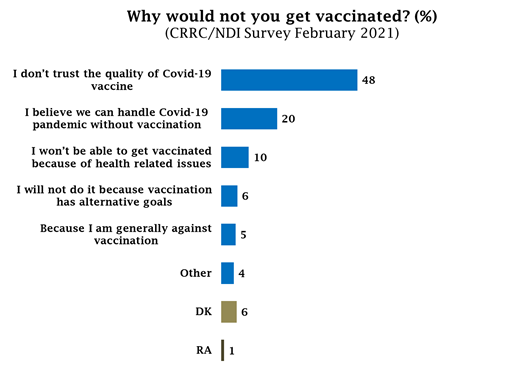
Note: Question was asked only to those who did not say they would vaccinate.
Who is most sceptical of vaccination?
In order to better understand Georgians’ attitudes towards COVID-19 vaccination and the reasons for hesitance, a regression model was run. The analysis showed that men were around 1.3 times more likely to say they would vaccinate than women. People over 54 were again 1.3 times more likely to say they would vaccinate than younger people. People with higher than secondary education were around 1.5 times more likely to be willing to vaccinate than those with secondary technical or secondary education.
Regression analysis also showed that Georgian Dream supporters were 1.5 times more likely to say they would vaccinate, compared to opposition supporters or people who do not identify with any political party.
Interestingly, people who named TV or the internet as their main source of information about COVID-19 were more likely to be willing to vaccinate, with internet users being more likely to say so than people who named other sources as primary.
There were no significant differences between people of different settlement types and employment statuses after controlling for other factors.
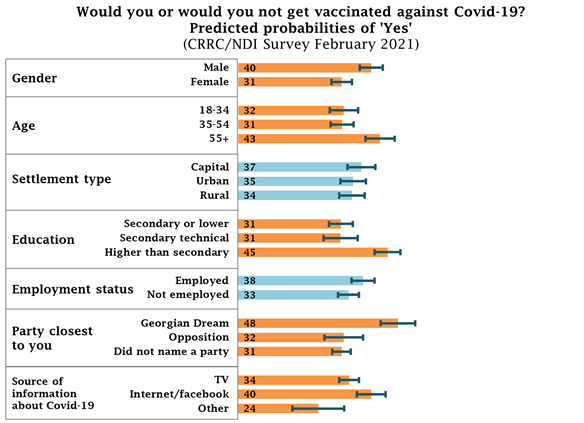
Note: This and the following charts were generated from a regression model. The model includes sex (male, female), age group (18–34, 35–54, 55+), settlement type (capital, urban, rural), education (secondary or lower, secondary technical, tertiary), employment status (employed, not employed), party support (Georgian Dream, opposition, did not name a party), and source of information about COVID-19 (TV, Internet/Facebook, other).
As for the reasons for not vaccinating, regression analysis shows that the quality of the vaccine was around 1.2 times more likely to be questioned by women than men. Opposition supporters were almost twice as likely to say they don’t trust the quality of COVID-19 vaccines.
People who named TV as their main source of information about COVID-19 were more likely to question the quality of the vaccine compared to people who named the internet or other sources as primary.
There were no significant differences between people of different ages, settlement types, education levels, or employment statuses.
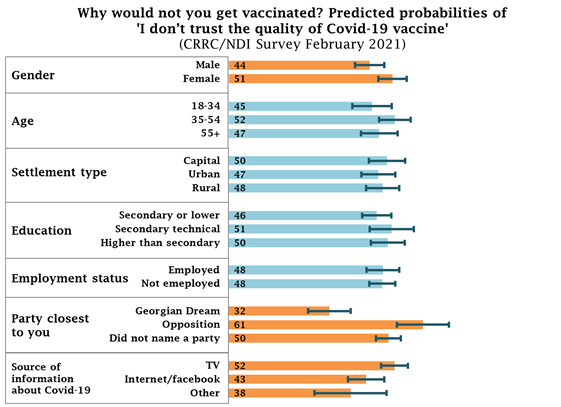
Who thinks we can handle the pandemic without vaccination?
Regression analysis also showed that men were 1.5 times more likely to state that they believed we can handle the pandemic without vaccination. Younger people were 1.9 times more likely to say the same, compared to people over 54.
Inhabitants of the capital were also 1.6 times more likely to think we can handle the pandemic without vaccination than people living in rural areas. Georgian Dream supporters were more than two times as likely to think so as opposition supporters.
Finally, people who named the internet as their main source of information about COVID-19 were 1.4 times more likely to say we can handle the pandemic without vaccination than people who name TV as their primary source.
No significant differences between people of different education levels and employment statuses were present.
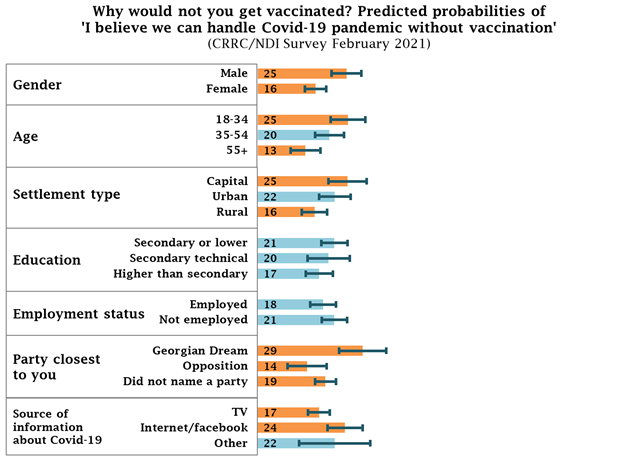
Regression analysis also suggested that when it comes to being against vaccination in general and attributing alternative goals to the vaccination process, education was the only factor that makes a difference in people’s opinions.
People with secondary or lower education were 1.9 times more likely be against vaccination in general or attribute alternative goals to vaccination, than people with higher education.
There were no significant differences between people of different sex, age, settlement type, employment status, party affiliation, or sources of information about COVID-19.
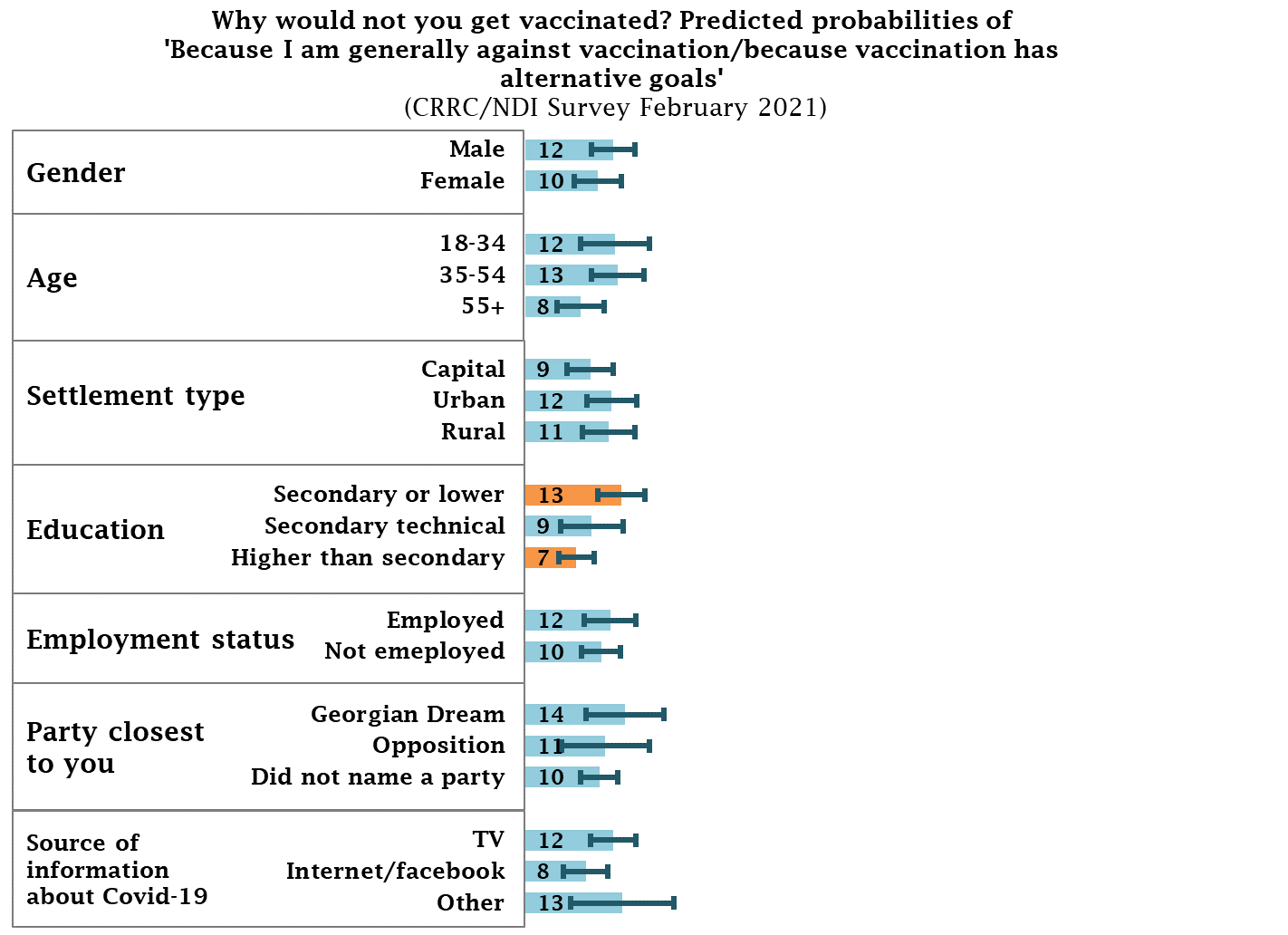
February 2021 data from the CRRC/NDI survey showed that the majority of Georgians are not convinced of the effectiveness of the government’s COVID-19 vaccination plan and also are not willing to vaccinate against COVID-19.
The most common reason for not doing so was a lack of trust in the quality of the COVID-19 vaccine and belief that pandemic can be handled without vaccination.
Men, older people, people with higher education, Georgian Dream supporters, and those who receive information about COVID-19 primarily from the internet were more likely to be willing to vaccinate.
When it comes to reasons for not vaccinating, women, opposition supporters, and people who name TV as their main source of information about COVID-19 were most likely to doubt the quality of the vaccine, while men, younger people, inhabitants of the capital, Georgian Dream supporters, and people who name the internet as their main source of information were most likely to believe that we can handle the pandemic without vaccination.
Additionally, people with secondary or lower education were more likely to be against vaccination in general and attribute alternative goals to it than people with higher education.
For more data on people’s attitudes towards various issues see the CRRC/NDI February 2021 survey dataset on CRRC’s online data analysis tool.








